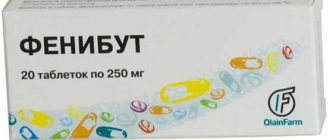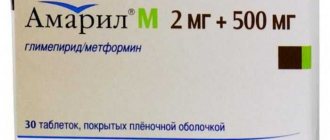What is included in the tablets?
The active component of the drug "Unidox" is the tetracycline antibiotic doxycycline. Each tablet contains 100 mg of this substance, which is what has an antibacterial effect on the body.
The medicine also contains additional components: magnesium stearate, microcrystalline cellulose, hyprolose, lactose monohydrate, colloidal silicon dioxide. These substances do not have a therapeutic effect, but contribute to better absorption of doxycycline.
The medicine is released only in tablet form. In the pharmacy chain you can find the drugs “Unidox” and “Unidox Solutab”. The only difference is that Unidox Solutab tablets can be crushed, dissolved in water and prepared as a suspension. This form is convenient when treating children. In all other respects, these drugs are absolutely identical.
The medicine looks like round tablets, convex on both sides. The number 173 is engraved on them - this is the drug code.
Unidox Solutab instructions
Instructions for use of Unidox Solutab contain a complete description of the drug and its action: composition, indications, use in treatment, contraindications, side effects, cost, analogues and reviews.
Form, composition, packaging
The drug is produced in the form of tablets that dissolve in the mouth and do not need to be swallowed. The shape is biconvex, round. The color is light yellow with a hint of grey. On one side there is a dividing line and a code inscription 173 on the other side.
The active substance Unidox Solutaba doxycycline monohydrate is supplemented with microcrystalline cellulose, lactose monohydrate, saccharin, anhydrous colloidal silicon dioxide, low-substituted hyprolose, magnesium stearate and hypromellose in the required quantity.
The packaging of the drug is a pack of cardboard, which contains a blister with ten tablets.
Storage period and conditions
The drug can be stored at temperatures ranging from 15 to 25 degrees for no more than five years. Children should not be allowed near the storage areas of the medicinal product.
Pharmacology
Unidox Solutab belongs to the tetracycline group of antibiotics with a broad spectrum of action. Capable of bacteriostatic effects and inhibition of the process of cellular protein synthesis in the pathogen cell, which is due to its interaction with ribosomal subunits (30S).
The activity of the drug extends to a number of gram-negative and gram-positive anaerobes, including some protozoa.
However, if resistance occurs, which is acquired by some pathogens to the active component of the drug, the resistance of the pathogen to any drug from this group should be taken into account.
Pharmacokinetics
Absorption of the drug, which is not affected by food intake, is rapid and occurs almost completely. Doxycycline reaches its maximum concentration in blood plasma within two hours after taking the tablet.
The active substance of the drug binds to plasma proteins by 90 percent, which is reversible and has good ability to penetrate tissue. The level of penetration into the cerebrospinal fluid is low and amounts to no more than 20 percent of the total concentration in the blood plasma. When liver function maintains normal levels, the drug is ten times more concentrated in bile than in plasma. Up to 25 percent of the total concentration of doxycycline is found in salivary fluid.
Penetration of doxycycline through the placental barrier and a small amount into breast milk is noted.
Dentin and bone tissue can accumulate the active substance Unidox Solutaba.
The metabolic process affects only a small part of doxycycline.
The half-life after the drug is taken orally lasts up to eighteen hours, repeated doses are eliminated over more than a day.
Slightly less than half of the dose can be excreted by the kidneys through the biologically active form, the rest is excreted through the intestines in the form of inactive chelates.
How does an antibiotic work?
The medicine affects microorganisms at the cellular level. Doxycycline affects the RNA of harmful bacteria and inhibits the formation of microbial proteins. It is effective against many gram-positive and gram-negative bacteria: streptococci, staphylococci, treponemas, salmonella, pathogens of many intestinal and genitourinary infections. In addition, it is capable of destroying some protozoan microorganisms - dysentery amoeba and plasmodium (the causative agent of malaria).
However, for some infections there will be no effect from using Unidox. The instructions say that doxycycline does not affect all types of viral and fungal microorganisms, as well as Proteus, enterococci and Pseudomonas aeruginosa.
Unidox does not adversely affect the natural microflora of the digestive system and does not reduce immunity.
Unidox Solutab 100: what is the price of the drug and where can I buy it?
Prices for the antibiotic drug Unidox Solutab 100 may change periodically depending on time and the exchange rate of the ruble. At the moment, its average price in pharmacies ranges from 500 to 600 rubles.
But you can buy it at half the price. So, in online pharmacies you can order it, on average, for 300 - 400 rubles along with fast delivery. Personally, I recommend that you buy this drug in online pharmacies. So you can save yourself a small amount of money and don’t waste time searching for it in regular pharmacies, because not every pharmacy has this drug in stock!
Also, do not forget that without the drug Enterozermina Unidox Solutab 100 can cause many side effects and undermine your health. The drug Enterozermina is very rarely on the shelves of pharmacies; you can only buy it by ordering in online pharmacies.
For what diseases is the drug prescribed?
If a patient is diagnosed with an infectious disease, the causative agent of which is susceptible to the effects of doxycycline, then the doctor may prescribe Unidox tablets. The use of antibiotics is indicated for the following pathologies:
- otolaryngeal infectious diseases (otitis media, sinusitis, sinusitis, tonsillitis, laryngitis, nasopharyngitis);
- respiratory pathologies caused by bacteria: bronchitis, pneumonia, tracheitis, lung abscess;
- gastrointestinal infections: gastroenteritis, cholecystitis, cholangitis, bacterial and amoebic dysentery, yersiniosis;
- sexually transmitted diseases: syphilis, gonorrhea, chlamydia, inguinal and venereal granuloma;
- eye damage from chlamydial infection (trachoma);
- tick-borne borreliosis (Lyme disease);
- whooping cough;
- sepsis;
- osteomyelitis;
- brucellosis;
- skin infections, acne;
- after operations to prevent purulent infection;
- genitourinary diseases caused by bacteria: cystitis, urethritis, endometritis, prostatitis, cervicitis, salpingoophoritis.
These are the most common indications for prescribing the Unidox antibiotic. In addition, the drug is effective against particularly dangerous infections and imported tropical diseases, such as:
- cholera;
- typhus (abdominal, typhus and relapsing);
- plague;
- malaria;
- legionellosis;
- Q fever;
- yaws;
- leptospirosis;
- Rocky Mountain spotted fever.
In some cases, it is possible to use Unidox tablets for preventive purposes. The instructions recommend prescribing the drug to people traveling to tropical countries to prevent infection with malaria and leptospirosis.
Unidox Solutab indications for use
The drug Unidox Solutab is prescribed for treatment for those patients who suffer from infectious-inflammatory diseases caused by microorganisms that are sensitive to the effects of the drug.
Infectious diseases of the respiratory tract
- treatment of pharyngitis;
- pleural empyema;
- acute bronchitis;
- lung abscess;
- obstructive pulmonary disease in the acute stage;
- tracheitis;
- community-acquired pneumonia;
- lobar pneumonia;
- bronchopneumonia.
Infectious diseases of the ENT organs
- treatment of otitis;
- tonsillitis;
- sinusitis.
Diseases of the genitourinary system of an infectious nature
- treatment of cystitis;
- endometritis, salpingoophoritis and endocercevitis in combination with other medications;
- pyelonephritis;
- bacterial prostatitis;
- orchiepididymitis in acute form;
- urethritis;
- urogenital mycoplasmosis;
- urethrocystitis.
Infectious diseases that are sexually transmitted
- treatment of urogenital chlamydia;
- lymphogranuloma venereum;
- syphilis in those patients who cannot tolerate penicillin;
- inguinal granulomas;
- uncomplicated gonorrhea.
Infectious diseases of the biliary tract and digestive tract
- treatment of traveler's diarrhea;
- cholera;
- dysentery, amoebic or bacillary;
- yersiniosis;
- gastroenterocolitis;
- cholangitis;
- cholecystitis.
Skin infections
- treatment of wound infections as a consequence of an animal bite;
- acne disease in severe form as a component of combination therapy.
Eye infections
- treatment of trachoma in combination with other medications.
Other infectious and inflammatory diseases
- treatment of yaws;
- brucellosis;
- legionellosis;
- whooping cough;
- chlamydia;
- Erchiliosis granulocytic;
- rickettsiosis;
- bartonellosis;
- Q fever;
- Rocky Mountain spotted fever;
- bartonellosis;
- typhus;
- Lyme disease;
- anthrax;
- tularemia;
- psittacosis;
- plague;
- psittacosis;
- actinomycosis;
- leptospirosis;
- malaria;
- osteomyelitis;
- peritonitis;
- septic subacute endocarditis;
- sepsis.
The drug is also recommended for use as a preventative measure for travelers to prevent malaria and for those who are undergoing surgery to prevent purulent complications.
Contraindications
There are also contraindications to the prescription; therefore, when considering the treatment option for a particular disease involving this medicine, attention should be paid to them. Unidox Solutab should not be prescribed:
- if the patient has severe renal or liver dysfunction;
- with a high level of hypersensitivity to antibiotics of this group;
- porphyria;
- pregnancy and lactation;
- children under eight years old.
When is the medicine contraindicated?
However, such an effective antibiotic as Unidox is not suitable for all groups of patients. First of all, it should not be taken by people with hypersensitivity to doxycycline and the auxiliary components of the tablets. It should not be used by patients who have previously been allergic to tetracycline medications.
There are other cases when the drug is strictly contraindicated. Unidox tablets should not be taken by pregnant or nursing mothers. Doxycycline is able to cross the placental barrier and also penetrate into breast milk. If a woman needs to undergo treatment during lactation, then breastfeeding should be stopped. This antibiotic is not prescribed to children under 8 years of age. Contraindications are due to the fact that doxycycline can accumulate in the bones and lead to calcium deposits in the skeleton of the fetus and small child. In addition, the drug can negatively affect the formation of teeth in children under 8 years of age.
Medicines containing doxycycline are contraindicated in patients with severe pathologies of the liver and kidneys and in patients diagnosed with porphyria.
Special instructions for the use of Unidox Solutab
Unidox Solutab is prescribed to patients with severe impairment of liver and kidney function only if treatment with other drugs is impossible, and the dose of the drug is reduced. Strains resistant to other tetracycline drugs may be resistant to doxycycline. Long-term use of the drug can cause hypovitaminosis due to the development of dysbacteriosis. The drug is contraindicated for use in the second and third trimester of pregnancy. Doxycycline slows down osteogenesis, increases bone fragility in the fetus, disrupts the normal process of tooth development (teeth color irreversibly changes, enamel hypoplasia occurs). Doxycycline is detected in breast milk in amounts that are 30–40% of its serum level. To prevent dyspepsia, it is recommended to take the drug with meals.
Undesirable effects of the drug
The body of some patients may react negatively to taking Unidox. Side effects may occur from the following organs and systems:
- Central nervous system. May cause headache, intracranial hypertension, dizziness.
- Gastrointestinal tract. Sometimes dyspeptic symptoms appear: nausea, vomiting, intestinal disorders, loss of appetite, and some patients experience symptoms of anorexia.
- Skin. Dermatitis, rashes, and hyperemia occur. Photosensitivity of the skin increases.
- Hematopoiesis: decrease in platelets and red blood cells, increase in the number of eosinophils.
- Other body systems. Oral or genital candidiasis may occur.
If such manifestations occur, you should report them to your doctor. After reducing the dose or stopping the antibiotic, all side effects disappear.
Side effects of the drug Unidox Solutab
Anorexia, nausea, vomiting, dysphagia, glossitis, possible diarrhea and enterocolitis caused by the growth of resistant strains of staphylococci, candidiasis due to the proliferation of Candida albicans (clinically manifested by diarrhea, glossitis, stomatitis, proctitis, vaginitis), maculopapular and erythematous rash, rarely exfoliative dermatitis, photosensitivity; urticaria, angioedema, anaphylactic reactions, pericarditis, exacerbation of systemic lupus erythematosus, hemolytic anemia, thrombocytopenia, neutropenia, eosinophilia.
How to take the pills?
The attending physician, depending on the nature of the disease, determines the required dose of antibiotic. Taking Unidox is recommended with meals. Take the tablets with water. If you use the Unidox Solutab dosage form, you can first crush and dissolve the tablets in 20 ml of water.
The following antibiotic treatment regimen is usually used:
- For adult patients: on the first day, take 200 mg of medication (2 tablets), divided into 2 doses. In the subsequent days of the course of treatment, take 100 mg (1 tablet) of the drug per day. For severe infectious diseases, 200 mg of antibiotic per day is prescribed throughout the entire therapy.
- For children over 8 years old and weighing more than 50 kg, the treatment regimen is the same as for adults.
- For children over 8 years old weighing less than 50 kg, the dose is calculated based on body weight. On the first day, take 4 mg of medication per 1 kg of weight. In the subsequent days of treatment, take 2 mg of the drug per 1 kg of body weight (in 2 doses). In severe cases, the dosage of 4 mg/kg is maintained throughout the entire course of treatment.
Treatment with the drug usually lasts from 5 to 10 days. For some diseases, the duration of therapy and the dosage of Unidox have their own characteristics:
- If infected with pyogenic streptococcus, the course of treatment should last at least 10 days.
- For syphilis, 2 tablets (200 mg per day) are prescribed for 14-28 days.
- When treating gonorrhea, chlamydia and ureaplasmosis of the genitourinary organs, it is recommended to take 2 tablets per day. The duration of therapy is about 7 days. In case of severe gonococcal infection, the dose can be increased to the maximum allowable - 300-600 mg per day, the course is 5 days.
- When treating acne on the skin, the drug is taken for a long time, from 6 to 12 weeks at a dosage of 100 mg per day.
- To treat leptospirosis, the antibiotic is taken at a dosage of 200 mg per day for a week. To prevent this disease, the drug is taken 200 mg once a week while staying in areas unfavorable for leptospirosis. Then take another 200 mg before leaving.
- To prevent malaria, take 100 mg of the medicine 1 day before the trip, and then the same dose daily during the trip. After returning home, antibiotics must be continued at the same dosage for another 4 weeks.
- 1 hour before a medical abortion, women take 1 Unidox tablet, and immediately after the intervention take 2 more tablets. This helps prevent infection.
It must be remembered that doxycycline greatly increases the skin's sensitivity to ultraviolet radiation. Therefore, during the course of treatment you should avoid tanning or use creams with a high degree of protection.
Composition and release form
For 1 tablet 100 mg:
- Active ingredients: doxycycline monohydrate (in terms of doxycycline) - 100 mg;
- Excipients: microcrystalline cellulose - 45 mg, saccharin - 10 mg, hyprolose (low-substituted) - 18.75 mg, hypromellose - 3.75 mg, colloidal silicon dioxide (anhydrous) - 0.625 mg, magnesium stearate - 2 mg, lactose monohydrate - up to 250 mg.
Tablets in the amount of 10 pieces in a blister made of PVC/aluminum foil. One blister along with instructions for use is placed in a cardboard box.
Compatibility with other medications and alcohol
Some medications may interfere with the absorption of doxycycline. These include antacids, iron supplements, and laxatives with magnesium. Therefore, you need to maintain an interval of 3 hours between taking Unidox and these medications.
It is not advisable to take vitamin A (retinol) during antibiotic treatment. This can cause headaches due to increased intracranial pressure. You should also not combine Unidox treatment with penicillin and cephalosporin antibiotics. These medications will decrease the effects of doxycycline.
Women taking hormonal contraceptives should remember that doxycycline reduces the contraceptive effect of these drugs and increases the likelihood of non-cyclic uterine bleeding.
Patients should know that Unidox and alcohol are incompatible. Drinking alcohol increases the metabolism of the drug, as a result, the concentration of the antibiotic in the blood plasma drops, and the therapeutic effect is reduced to zero. At the same time, a double load falls on the liver, which manifests itself in nausea, vomiting, abdominal pain, diarrhea, and dizziness.
Barbiturates, Carbamazepine, Phenytoin, and Rifampicin can also reduce the therapeutic effect of the antibiotic.
What does gynecology treat?
A wide spectrum of action allows the use of Unidox Solutab in various fields of medicine. Gynecologists can prescribe it for the treatment of sexually transmitted infections:
- Chlamydia.
- Ureaplasmosis.
- Gonorrhea.
- Syphilis.
This is achieved due to the activity of doxycycline against specific pathogens, including intracellular ones (chlamydia, ureaplasma). In this case, the localization of inflammation does not matter - the drug will help with colpitis, urethritis, cervicitis, etc.
Analogues of the drug
Patients are often interested in analogues of Unidox. You can choose drugs with the same active ingredient - doxycycline. The following medications fall into this category:
- "Doxycycline."
- "Vibramycin."
- "Doxibene."
- "Xedocin."
- "Dovitsin."
- "Doxilan."
- "Monocline".
- "Bassado".
Of these drugs, Doxycycline is the most common analogue of Unidox. Its price is very low - from 12 to 32 rubles.
Can Doxycycline be considered a complete replacement for Unidox Solutab soluble tablets? If we consider the chemical composition of these drugs, they contain different modifications of the same medicinal substance. Doxycycline is produced on the basis of hydrochloride, and Unidox Solutab is produced on the basis of monohydrate. They have the same therapeutic effect, but there are slight differences:
- Soluble tablets (solutab) are better absorbed by the body.
- Solutab tablets have fewer side effects, as they dissolve well and are absorbed in the intestines. Doxycycline begins its action in the stomach, which often causes cramps and pain.
- Unidox Solutab goes through several stages of purification during production and is a safer medicine.
We can conclude that Doxycycline is a cheap analogue of Unidox and is somewhat more difficult to tolerate by the body.
Analogues of the drug "Unidox Solutab"
Analogs in structure containing an identical active substance are:
- "Vidoccin."
- "Doxilan."
- "Doxal."
- "Doxycycline Nycomed"
- "Dovitsin."
- "Bassado".
- "Monocline".
- "Doxycycline."
- "Stad's Doxycycline."
- "Doxycycline hydrochloride."
- "Doxibene."
- "Xedocin."
- "Doxycycline-AKOS".
- "Vibramycin."
Each organism is individual, so Unidox Solutab may not be suitable for everyone. The drug is highly effective, but not in all cases it is possible to achieve the desired result. If after 2-3 days of using the drug there are no positive changes or improvement in the patient’s well-being, the doctor replaces the medication.
When Unidox does not help, the following analogues of this remedy are used:
- Vibramycin D;
- Doxa-M-Ratiopharm;
- Medomycin;
- Doxilan;
- Tardox;
- Doxibene;
- Doxycycline.
Reviews about the medicine
You can find positive reviews from doctors of various specialties about the drug Unidox. Dermatologists note the effectiveness of the antibiotic in the treatment of juvenile acne, demadecosis, and rosacea. Venereologists, gynecologists and urologists believe that the use of this medicine quickly relieves signs of genitourinary infections. Gastroenterologists testify to good results from Unidox treatment of such ailments as chronic cholecystitis, duodenostasis, and bacterial overgrowth syndrome in the intestines.
Doctors believe that Unidox Solutab soluble tablets have fewer side effects and are better tolerated than regular Doxycycline. Doctors consider the only disadvantage of the drug to be its ability to cause photosensitization of the skin, because of this, patients have to limit their exposure to the sun.
Patients' opinions about the drug are mostly positive. The antibiotic has helped many women and men recover from genitourinary infectious diseases. Some patients write that the drug even helped them get rid of infertility caused by inflammatory processes in the pelvis.
People report good results in treating acne and inflammatory dermatological diseases with antibiotics. After completing a course of therapy with Unidox in combination with other drugs, the condition of the skin improved significantly.
Negative reviews about the drug are associated with the occurrence of side effects after taking it. The patients experienced mainly dyspeptic symptoms, and in some cases thrush.
Sometimes patients write that the drug did not help. But in these cases, the antibiotic was not always taken as prescribed. For example, they tried to treat ARVI with Unidox tablets. But we must remember that this drug is not a panacea for all possible infections. Viral colds are not among the indications for its use. Such a potent antibiotic should only be taken on the recommendation of a doctor.
Unidox Side effects
Side effects may include: nausea, drowsiness, diarrhea, weakness. Symptoms that, although unlikely, may also occur in you:
- Nausea, which can be caused by pressure
- - drowsiness;
- - periodic feeling of weakness;
- - diarrhea;
- - allergic reaction;
- - disruption of normal liver function;
- — development of candidiasis;
If you experience at least one of the above listed causes and symptoms, then you should stop taking the drug immediately and immediately consult a doctor.











